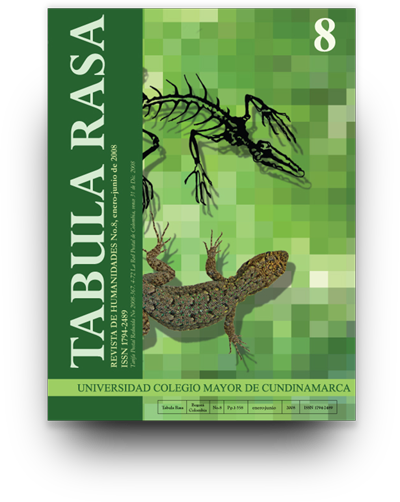Diversity and Culture: Objectification and Situationality
Diversidad y cultura. Reificación y situacionalidad
Show authors biography
Anthropology has theoretically confronted racism and discrimination. The paradox is that once the concept of culture started to become widely accepted, it was also redefined as race. Another paradox is that the arguments for diversity and relativism were appropriated by sectors that promote discrimination. This essay analyzes the Huntingtonian theses about the «clash of civilizations». The political resource of culture does not have a single expression, and is appropriated by different sectors struggling with each other. It will also be shown that this generalization of culture is far away from not having specific and delimitable political effects. This dialectic of culturalism requires a series of disruptions of anthropological theory. The most theoretically absurd and politically ruinous consists of the equalization of culture and identity.
Article visits 650 | PDF visits 280
Downloads
Abu-Lughod, Lila. 1999. “The Interpretation of Culture(s) after Television”, en Ortner, S. (ed.): The Fate of ‘Culture’. Geertz and Beyond, Los Angeles: University of California Press.
Appadurai, Arjun. 2001. La modernidad desbordada, Buenos Aires: FCE.
Barker, Martin y Anne Beezer. 1994. Introducción a los estudios culturales, Barcelona: Bosch.
Barth. Frerik. 1976. «Introducción», en Los grupos étnicos y sus fronteras, México: FCE.
Brumann, Christoph et al.. 1999. “Writing for Culture: Why a Successful Concept Should Not Be Discarded”, “Comments” y “Reply”, en Current Anthropology, 40:1-41.
Ferguson, Marjorie y Peter Golding (eds.). 1997. Cultural Studies in Question, London: Sage.
Fraser, Nancy. 1998. «La justicia en la era de las “políticas de identidad”: redistribución, reconocimiento y participación», en Apuntes de Investigación, nº 2/3, Buenos Aires.
Geertz, Clifford. 1987. La interpretación de las culturas, Buenos Aires: Gedisa.
Grimson, Alejandro. 2006. “Cultures are more Hybrid than Identifications. A Dialogue on Borders from the Southern Cone”, Journal of Latino Studies, 4:96-119.
Hall, Stuart et.al. (ed.). 1980. Culture, media and language, London: Hutchinson.
Hannerz, Ulf. 1996. Conexiones transnacionales, Madrid: Cátedra.
Hannerz, Ulf. 1997. «Fluxos, fronteiras, híbridos: palavras-chave da antropologia trasnacional», en Mana. Estudos de Antropologia Social, 3 (1), Rio de Janeiro, abril.
Hannerz, Ulf. 1999. “Comments”, comentarios al artículo de Brumann (1999), en Current Anthropology, vol. 40, febrero.
Hoggart, Richard. 1990. La cultura obrera en la sociedad de masas, Barcelona: Crítica.
Hungtinton, Samuel. 2004a. El choque de civilizaciones, Buenos Aires: Paidós.
Hungtinton, Samuel. 2004b. ¿Quiénes somos? Los desafíos a la identidad nacional estadounidense, Buenos Aires: Paidós.
Kuper, Adam. 2000. Culture. The Anthropologist’ Account,Cambridge: Harvard University Press.
Lomnitz, Claudio. 2004. «Por amor a la patria», en Fernando Escalante Gonzalbo (coord.): Otro sueño americano, 11-24. México: Paidós.
Ortner, Sherry. 1999. “Introduction”, en Sh. Ortner (ed.). The Fate of ‘Culture’. Geertz and Beyond, 1-13. Los Angeles: University of California Press.
Sahlins, Marshall. 1997. «O “pessimismo sentimental” e a experiência etnográfica: por que a cultura não é um “objeto” em via de extinção» (Parte I y II), en Mana, 3(1 y 2):41-73 y 103-149.
Said, Edward. 2004. Orientalismo, Buenos Aires: Ramdon House Mondadori.
Segato, Rita. 1998. «Alteridades históricas/Identidades políticas: una crítica a las certezas del pluralismo global», Série Antropologia, nº 234, Brasília, UnB.
Stolcke, Verena. 1999. «Nuevas retóricas de la exclusión en Europa», en Revista Internacional de Ciencias Sociales, nº 159, Marzo.
Thompson, Edward. P. 1989. La formación de la clase obrera en Inglaterra, Barcelona: Crítica.
Williams, Raymond. 1980. Marxismo y literatura, Barcelona: Península.
Wimmer, Andreas. 1999. “Comments”, comentarios al artículo de Brumann (1999), e Current Anthropology, vol. 40, febrero.
Yúdice, George. 2003. El recurso de la cultura, Barcelona: Gedisa.




